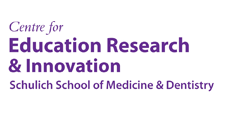Event Title
Naturalistic Exploration of Intraoperative Challenges Faced by Surgical Experts
Start Date
5-10-2011 12:00 PM
End Date
5-10-2011 1:00 PM
Abstract
1. Rationale
Research on medical expertise has traditionally focused on understanding routine problem solving patterns in order to train for efficient approaches to common problems. Currently, however, expertise research is grappling with the question of how experts adapt to novel challenges, and how we can better train for flexibility and innovation in the face of uncertainty. The present study seeks to further the understanding in this area, by exploring the nature of the challenges experts encounter and the processes by which they assess and respond to challenges.
2. Methods
This study followed an ethnographic approach involving intraoperative observations and postoperative interviews with expert surgeons. Six faculty surgeons were selected through purposive sampling. Two to three surgical cases were observed per surgeon. A template analysis was implemented and NVivo qualitative data analysis software was used to apply the thematic coding structure and to support the interpretive analysis.
3. Results
Two key aspects of surgical challenges were identified: the nature of surgical challenges, and the actions performed by experts to derive information about the challenge. Intraoperative challenges manifested in three different types: judgment challenges, technical challenges and situational challenges. When surgeons found themselves ‘inside’ a challenge, they would seek and interpret particular patterns of cues to assess the nature of the challenge. Cue‐seeking activities seemed to be specific to challenge types.
4. Discussion
The definitional distinction between different types of challenges provided by this study is new in the surgical literature, and may constitute the first part of a language for defining a taxonomy of adaptations exerted by surgical experts when facing complex situations. From an educational perspective, this language might help surgical faculty render explicit their tacit adaptive strategies for training purposes.
This document is currently not available here.
Naturalistic Exploration of Intraoperative Challenges Faced by Surgical Experts
1. Rationale
Research on medical expertise has traditionally focused on understanding routine problem solving patterns in order to train for efficient approaches to common problems. Currently, however, expertise research is grappling with the question of how experts adapt to novel challenges, and how we can better train for flexibility and innovation in the face of uncertainty. The present study seeks to further the understanding in this area, by exploring the nature of the challenges experts encounter and the processes by which they assess and respond to challenges.
2. Methods
This study followed an ethnographic approach involving intraoperative observations and postoperative interviews with expert surgeons. Six faculty surgeons were selected through purposive sampling. Two to three surgical cases were observed per surgeon. A template analysis was implemented and NVivo qualitative data analysis software was used to apply the thematic coding structure and to support the interpretive analysis.
3. Results
Two key aspects of surgical challenges were identified: the nature of surgical challenges, and the actions performed by experts to derive information about the challenge. Intraoperative challenges manifested in three different types: judgment challenges, technical challenges and situational challenges. When surgeons found themselves ‘inside’ a challenge, they would seek and interpret particular patterns of cues to assess the nature of the challenge. Cue‐seeking activities seemed to be specific to challenge types.
4. Discussion
The definitional distinction between different types of challenges provided by this study is new in the surgical literature, and may constitute the first part of a language for defining a taxonomy of adaptations exerted by surgical experts when facing complex situations. From an educational perspective, this language might help surgical faculty render explicit their tacit adaptive strategies for training purposes.
